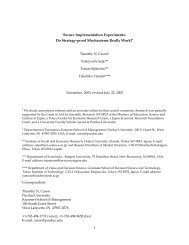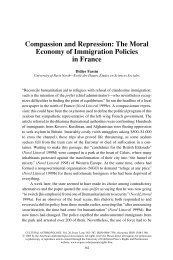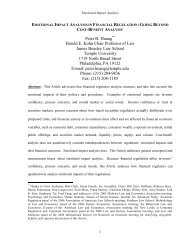Governance, Growth, and Development Decision-making - School of ...
Governance, Growth, and Development Decision-making - School of ...
Governance, Growth, and Development Decision-making - School of ...
Create successful ePaper yourself
Turn your PDF publications into a flip-book with our unique Google optimized e-Paper software.
The actual impact <strong>of</strong> democratic institutions on growth is, in<br />
fact, highly contextual. In countries ruled by competent developmental<br />
states, greater political participation, particularly if introduced<br />
suddenly, may lead to increased dem<strong>and</strong>s for redistribution<br />
<strong>and</strong> rent-seeking, both <strong>of</strong> which may be detrimental to growth. On<br />
the other h<strong>and</strong>, in countries with some combination <strong>of</strong> predatory<br />
states, low capacity, <strong>and</strong> high levels <strong>of</strong> corruption, democratic accountability<br />
may be the only route available to institutional change<br />
<strong>and</strong> long-term growth.<br />
3. Endogeneity <strong>and</strong> Feedback Loops<br />
I take for granted the fact that a certain basic level <strong>of</strong> state capacity<br />
is the sine qua non <strong>of</strong> any degree <strong>of</strong> economic growth. Collier<br />
(2007) 6 demonstrates the converse <strong>of</strong> this, that absence <strong>of</strong> a state <strong>and</strong><br />
the existence <strong>of</strong> conflict is bad for growth). Beyond this, however,<br />
there is a large debate over the endogeneity <strong>of</strong> institutions, <strong>and</strong> the<br />
degree to which the political <strong>and</strong> social consequences <strong>of</strong> growth<br />
have feedback impacts on growth.<br />
Jeffrey Sachs has been a lonely voice arguing that institutions<br />
are almost entirely endogenous to growth. 7 He is undoubtedly right<br />
that institutions are to some extent endogenous; very poor countries<br />
lack human <strong>and</strong> material resources to staff bureaucracies <strong>and</strong><br />
provide a range <strong>of</strong> public goods. But his failure to recognize the<br />
6<br />
Collier, Paul, (2007). The Bottom Billion: Why the Poorest Countries are<br />
Failing <strong>and</strong> What Can Be Done About It (Oxford: Oxford University Press)<br />
7<br />
See: Sachs, Jeffrey <strong>and</strong> John W. McArthur (2001). Institutions <strong>and</strong> Geography:<br />
Comment on Acemoglu, Johnson, <strong>and</strong> Robinson (2000) (Cambridge,<br />
MA: NBER Working Paper 8114); Sachs, Jeffrey <strong>and</strong> Andrew Warner (1995).<br />
Natural Resource Abundance <strong>and</strong> Economic <strong>Growth</strong> (: NBER Working Paper<br />
5398).<br />
Francis Fukuyama 29
















